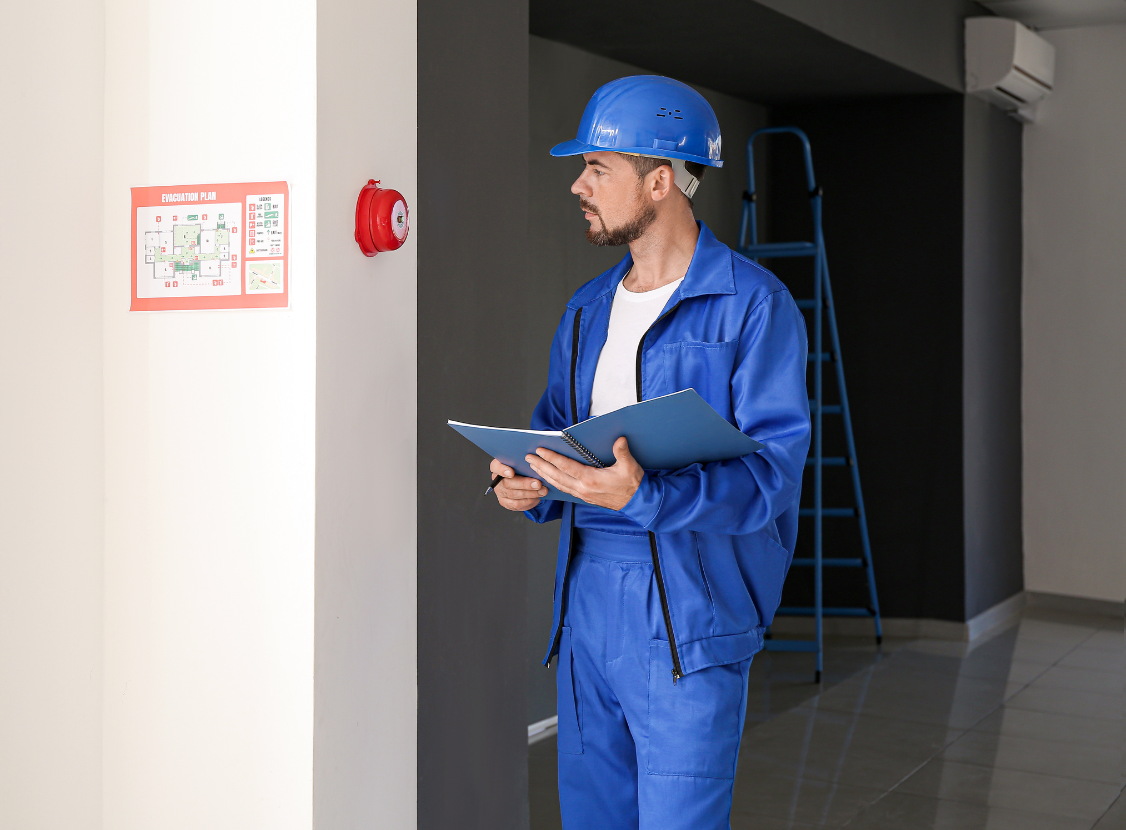
The competence of those carrying out fire risk assessments is critical to identifying and managing fire risks effectively. BS 8674, released in August 2025, sets out a national benchmark for assessing the capability of individual fire risk assessors.
This new code of practice promotes consistency, quality, and accountability in fire risk assessments, helping to support safer outcomes and informed decision-making.
In this guide, we explore how BS 8674 defines fire risk assessor competency to provide clarity for duty holders responsible for appointing fire risk assessors.
What is BS 8674?
BS 8674 is a new British Standard titled Built environment – Framework for competence of individual fire risk assessors – Code of practice, which provides a nationally recognised framework for assessing fire risk assessor competence.
BS 8674 sets out clear expectations for the skills, knowledge, experience, and behaviours required at different levels of fire risk assessor competence: Foundation, Intermediate, and Advanced, which we talk about later in this guide.
The standard is designed for fire risk assessors carrying out general, non-invasive fire risk assessments based on visual inspections and existing records. It specifically excludes destructive inspections, external wall assessments, and fire engineering services.
Why has BS 8674 been developed?
BS 8674 has been developed in response to growing regulatory and industry concerns about the competence of individuals carrying out fire risk assessments. These concerns were brought into sharp focus by incidents such as the Grenfell Tower fire.
The Grenfell fire exposed serious shortcomings in how fire risks were identified, understood, and managed in high-rise residential buildings. Investigations revealed that assessments were sometimes carried out by individuals without the expertise to recognise critical fire safety issues, particularly in complex or higher-risk buildings. This led to widespread calls for greater oversight and clearer standards of competence for those responsible for assessing fire risk.
For duty holders, the introduction of BS 8674 means there is now a clear fire risk assessor competency framework to help with the selection of assessors who are suitably qualified and experienced for the level of fire risk at a particular premises. This supports compliance with legal duties under the Regulatory Reform (Fire Safety) Order, Article 18, where appointing a competent person is a fundamental requirement.
What does BS 8674 cover?
BS 8674 introduces fire risk assessor competency criteria for different types of buildings and levels of risk.
Defined skills and knowledge
BS 8674 sets out detailed fire risk assessor competency criteria for assessors at each of the three levels: Foundation, Intermediate, and Advanced.
These criteria are based on a combination of technical skills, fire safety knowledge, practical experience, and professional behaviours, with each level building on the one before.
The summary below outlines each level of competence, but for full details of the requirements and expectations at each level, please refer to the complete BS 8674 standard.
Foundation-level competence
Foundation-level assessors are expected to be competent for carrying out general, non-invasive fire risk assessments in low-risk premises (for example, small offices or shops), where limited complexity allows them to work independently.Their capabilities include:
- Understanding the principles and methodologies of fire risk assessment, including legal duties and guidance.
- Carrying out structured visual inspections and identifying basic hazards.
- Explaining fire development and evacuation principles, including means of escape, signage, and passive/active protection systems.
- Advising duty holders on basic improvements to fire safety measures.
- Communicating clearly in written and verbal reports.
- Recognising when a situation exceeds their competence and escalating appropriately.
- Demonstrating a commitment to continuing professional development (CPD).
Intermediate-level competence
Assessors at this level must be able to assess moderate-risk premises independently, with the ability to supervise others and manage more complex assessments. In addition to all Foundation-level competencies, they must:
- Evaluate more complex building layouts, fire strategies, and occupancy types.
- Interpret and apply a broader range of technical standards and fire safety legislation.
- Provide proportionate, evidence-based fire safety recommendations.
- Analyse and document findings with clarity, even in more challenging environments.
- Support and mentor Foundation-level assessors where appropriate.
- Understand when further specialist input is required (e.g. for external wall assessments or fire engineered solutions).
Advanced-level competence
Advanced-level assessors are expected to work autonomously on high-risk or complex buildings, where specialist knowledge and strategic thinking are required. Their competencies include:
- Synthesising theory, experience, and technical knowledge to manage high-stakes assessments.
- Identifying intolerable risks and proposing appropriate risk mitigation strategies.
- Interpreting fire strategies, fire-engineered solutions, and regulatory compliance at a strategic level.
- Advising on fire risk in specialised environments (e.g. healthcare, complex residential, high-rise).
- Leading, mentoring and developing others in the field of fire risk assessment.
- Driving improvements in assessment methodology and contributing to wider industry best practice.
- Maintaining high levels of professional integrity, situational awareness, and ethical judgement.
Matching competence to risk
The BS 8674 three-tier framework helps duty holders match the competence of a fire risk assessor to the complexity and risk profile of the premises.
- Foundation-level assessors are suited to low-risk premises, such as small offices, shops, village halls, and low-rise residential blocks, where layouts are simple, occupancy is low, and fire hazards are minimal.
- Intermediate-level assessors are appropriate for moderate-risk buildings, including hotels, multi-occupied offices, care settings, and mid-rise buildings with more complex layouts, higher occupancy, or a moderate level of fire risk.
- Advanced-level assessors are needed for high-risk or complex environments, such as high-rise residential buildings, hospitals, specialised housing, or premises with complex fire safety systems, vulnerable occupants, or significant fire hazards.
This tiered structure helps ensure that assessors only undertake work appropriate to their level of demonstrated competence.
Professional and ethical standards
In addition to technical knowledge and practical experience, BS 8674 places strong emphasis on fire risk assessors’ professional and ethical conduct. This ensures that fire risk assessments are trustworthy, impartial, and in the best interest of life safety.
The standard includes a model code of conduct, setting out the ethical principles that all fire risk assessors, regardless of competence level, are expected to follow. These principles promote transparency, accountability, and professionalism across the sector.
Assessors must:
- Operate ethically, honestly, and independently – always acting in the interest of life safety, without bias or undue influence from commercial or organisational pressures.
- Avoid conflicts of interest and disclose any limitations in competence – assessors should not undertake work beyond their ability and must inform clients if a situation requires expertise outside their scope.
- Maintain accurate, clear, and proportionate records – reports and recommendations must be well-reasoned, evidence-based, and communicated in a way that can be understood by duty holders and enforcing authorities.
- Demonstrate respect, fairness, and inclusion – assessors are expected to engage professionally with clients, colleagues, and residents, upholding principles of equality and treating everyone with dignity.
- Commit to ongoing professional development (CPD) – fire risk assessors must regularly update their knowledge and skills to stay current with legislation, emerging risks, new building materials, and industry best practice.
A competent assessor must act with integrity and understand the wider responsibility they hold in protecting people and property from fire.
Understanding and respecting competence limits
A core principle of BS 8674 is that fire risk assessors must only undertake work that falls within the boundaries of their proven competence. This means understanding not just what they are trained to do, but also where their skills, knowledge, or experience may fall short.
The standard provides clear guidance on how assessors should:
- Recognise the limits of their own competence, including the types of buildings, risk profiles, or assessment methods they are qualified to handle.
- Decline or refer work that exceeds their level, whether due to complexity, unfamiliar hazards, or legal responsibilities that require more advanced understanding.
- Escalate appropriately by involving a more competent assessor, requesting support from a colleague or supervisor, or advising the duty holder to seek specialist advice.
BS 8674 also reinforces that competence is not static. Assessors must actively reflect on their capabilities, particularly when faced with new building types, emerging technologies, or unfamiliar fire safety systems. Where necessary, they should undertake additional training or supervised experience before progressing to the next level of responsibility.
For duty holders, this underscores the importance of matching the right assessor to the specific risk profile of their premises, not relying on job titles or previous experience alone.
How does BS 8674 fit within the existing landscape?
BS 8674 builds on the following established standards and guidance documents within the fire safety and building safety framework:
- BS 8670-1 – Core criteria for competence in building safety.
BS 8674 applies the overarching principles from BS 8670-1 to the specific role of fire risk assessors, defining what competence looks like in practice at Foundation, Intermediate, and Advanced levels. - PAS 79-1 – Fire risk assessment – Methodology for non-residential premises.
While PAS 79-1 outlines how to carry out a fire risk assessment, BS 8674 focuses on who is competent to do so. It ensures that the person applying the PAS 79-1 methodology is appropriately qualified and experienced. - BS 9792 – Fire risk assessments in housing – Code of practice.
BS 8674 complements BS 9792 by clarifying the competence requirements for assessors working in residential buildings, including multi-occupied housing and specialised housing types. - PAS 9980 – Fire risk appraisal of external wall construction and cladding.
While PAS 9980 provides a methodology for appraising external wall systems, BS 8674 helps ensure that only assessors with the appropriate competence, usually at the Advanced level, undertake or advise on these more complex assessments.
BS 8674 fills a critical gap by addressing who is qualified to assess fire risk.
Who is responsible for appointing a competent fire risk assessor?
Under the Regulatory Reform (Fire Safety) Order 2005, duty holders are responsible for appointing one or more competent persons to assist with fire safety responsibilities, including carrying out fire risk assessments (Article 18). This legal duty is further supported by BS 8674 (Clause 0.1).
Depending on the type of premises, the duty holder may be the employer, building owner, responsible person, or managing agent.
Read the full standard
For comprehensive information on the competencies, responsibilities, and ethical standards covered in BS 8674, please download the full framework: BS 8674:2025 – Framework for competence of individual fire risk assessors.
Do you need a competent fire risk assessor?
Whether your premises is a low-risk commercial space or high-risk, complex building, our fire safety consultants provide tailored fire risk assessments that help you protect lives, meet your legal obligations and comply with the latest standards, including BS 8674.
As a BAFE SP205 certified and NSI Gold approved provider, we deliver fire risk assessments that go beyond compliance, offering practical, proportionate recommendations. Our team includes former fire service professionals with hands-on experience across a range of industries.
Contact our fire safety experts today to discuss your needs: 0203 011 4242 / info@praxis42.com

Rob Sherman
Director of Fire Safety
